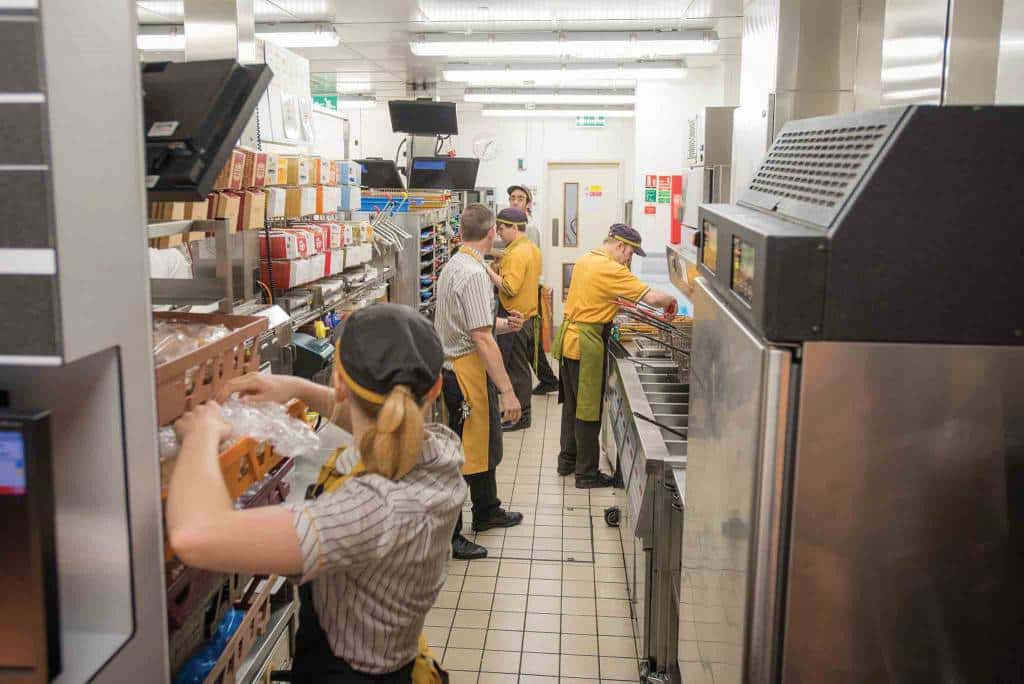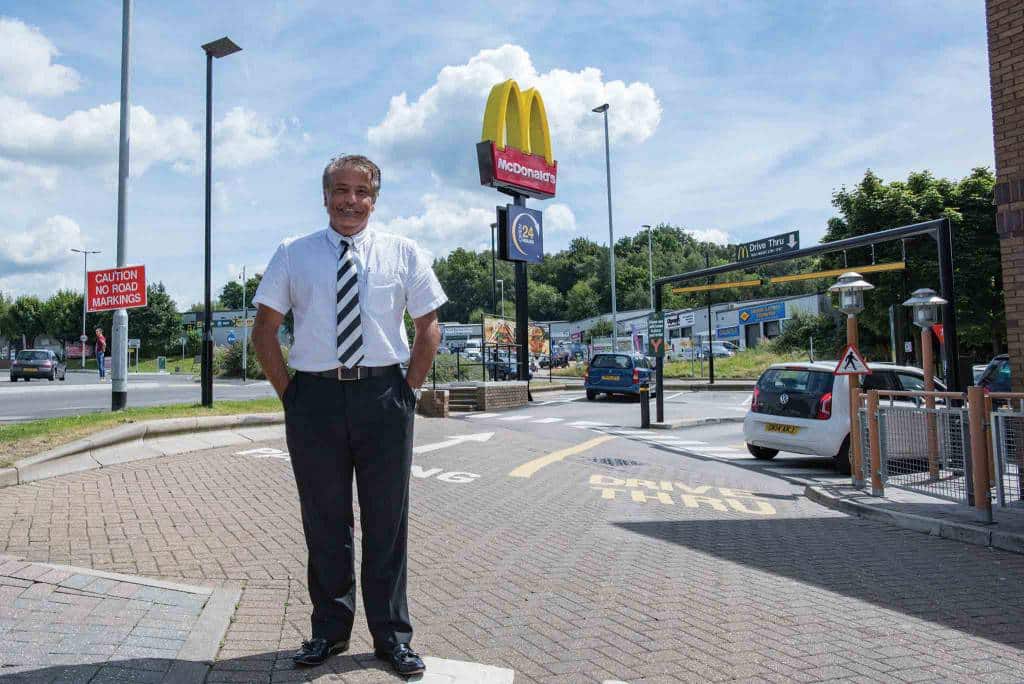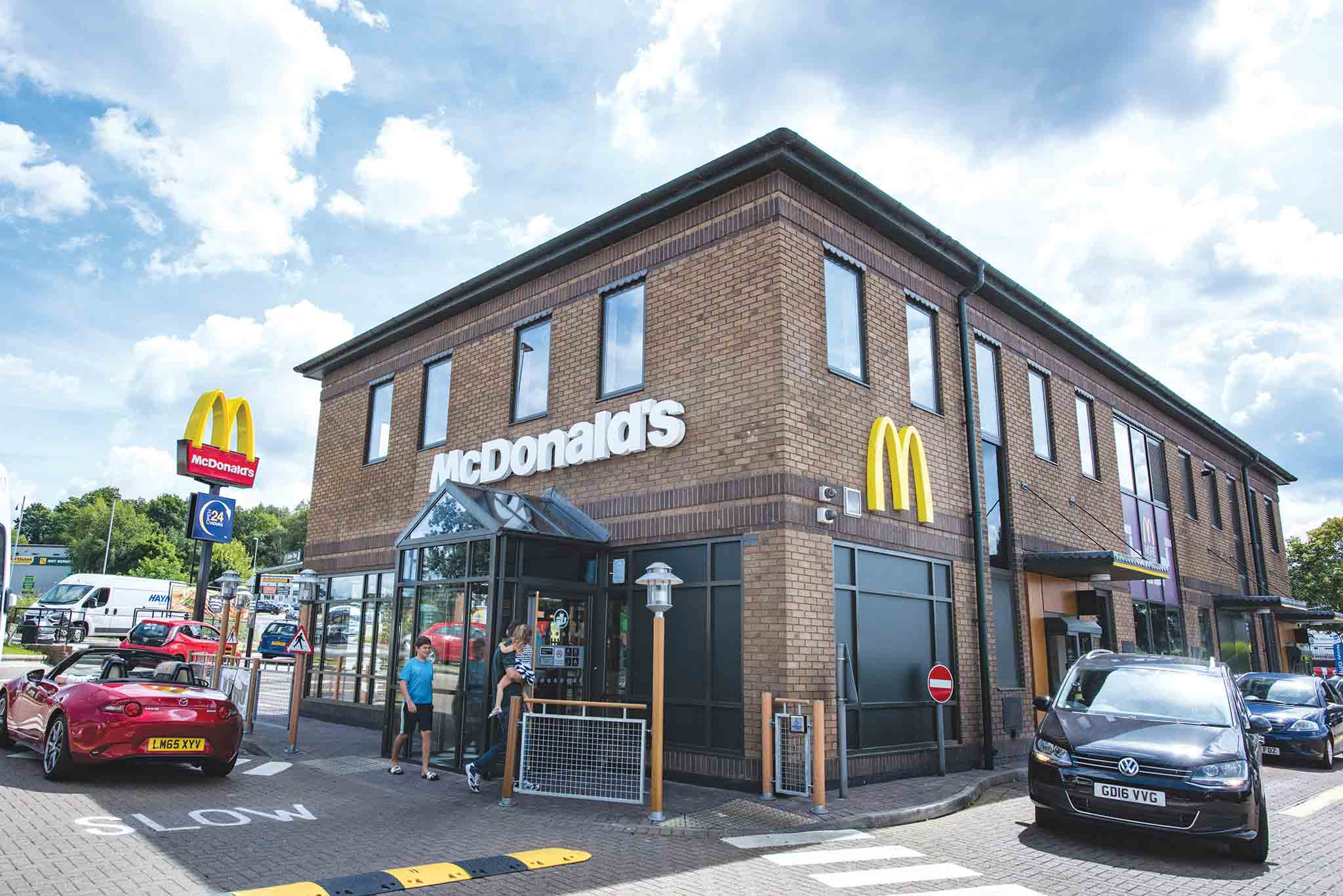Love it or loathe it, the fast food industry makes up a large part of the economic landscape and nothing epitomises the sector more than McDonald’s, which employs 85,000 people in the UK across 1,200 restaurants.
Many of these are operated by one of the 600 franchises, and the two in Tunbridge Wells – which can be found in the Royal Victoria Place food court and in the Dowding Way business park – are no exception.
Mahbod Mohammadi has run the franchise since 1993 after climbing the ranks from when he joined the world-famous brand as a part-time kitchen worker in 1980.
His insight, therefore, into how the company works and where it is heading is second to none.
During his time running the franchise in Tunbridge Wells he has witnessed many changes and has taken some risks.
The biggest was opening the Dowding Way drive-through in the business park on September 7, 1998, at a time when it was quite literally on the edge of Tunbridge Wells.
“It was the edge of nowhere,” Mr Mohammadi admits. “There was no cinema, there were hardly any retail shops around here… we were on our own.
“I remember the first day we opened, and at the end of the day I had a representative from McDonald’s come in to congratulate me and I was standing there thinking, ‘what have we done here? It is so quiet, this is going to be hard work’.
“We have certainly moved on since then.”
With the rapid expansion of the business park – which has diversified into retail outlets over the past decade, the building of the Knights Park leisure facilities and a new housing development on the way, his decision to locate a restaurant on Dowding Way now looks like an act of foresight that was pure genius.
“We have been very lucky with the development in the surrounding area and when the roadworks [on the A21] are done it’s going to be fantastic.”
He added that the roadworks over the winter to improve Longfield Road had been quite detrimental for business, but he noticed a huge improvement upon completion.
“Tunbridge Wells people know exactly what is going on and know when to stay away and when to come over here. So congestion has a big impact on us.”
At one point Mr Mohammadi owned three restaurants in the town, but decided to close his first one on Grosvenor Road, near the entrance to the Royal Victoria Place shopping centre, a couple of years after the outlet in the food court was opened.
But while this made good commercial sense at the time of its closure eight years ago, he does sometimes wonder if it was the right choice.
“At the time I was not sure the town needed two so close to each other. From a takings point of view the one outside was getting quieter and quieter. There wasn’t a lot going on in the evenings in the town centre.
“It was a really big building as well, and very expensive to maintain, so we decided to combine the two and keep the one in the shopping centre – which we expanded to include the neighbouring unit.”
He said the transfer of customers from the Grosvenor Road outlet was one of the largest McDonald’s had seen at the time and all the staff were offered new jobs in the remaining two restaurants.
“But when you look at the site now, I sometimes sit there and think we shouldn’t have closed it. It was a fantastic building and that part of the town centre has got a lot busier now.”
Mr Mohammadi has not ruled out looking for a second town centre site on the back of the expected upswing in visitors coming to Tunbridge Wells once the expansion of the shopping centre is completed – something he hopes will benefit his food court store as well.

He dismisses the condescending notion of a ‘McJob’ and highlights the many opportunities available for career advancement.
“The managerial programme is well recognised and can be an advantage in other jobs.
“We don’t have many people who go ‘Oh, I’m only serving fries and have not achieved my objectives’ because we do have a percentage of part-timers who are still studying.
“They are here because they want to earn a bit of money and have fun. We know it’s not everyone’s cup of tea and not everyone who starts with us will stay for the rest of their lives. It just doesn’t happen.
“But we do have a very effective training system and there are a lot of opportunities for people to do other roles and get qualifications if they want it. Of course not everyone does.
“We are not naïve enough to think everyone who works here loves us and wants to stay forever.”
When it comes to making a profit, volume is key, especially when a regular hamburger will only set the customer back by 99p.
However, the amount Mohammadi’s franchise makes off of each one can vary considerably, he explained.
“It is not so simple as saying out of the hamburger ten per cent goes to the supplier, 15 per cent goes on wages… it doesn’t work like that.
“We get a box of meat from the suppliers, we know how much we have to pay McDonald’s as a percentage, that includes rent, advertising and a service fee – so we know exactly how much we pay McDonald’s.
“But on top of that there are the payroll costs, the utilities, miscellaneous costs. There is not a lot of profit left by the time you sell the hamburger.
“Once you add up all the hamburgers we sell then with decent business control it is a profitable business.”
He said, as a rough estimate, he is currently making just under 5p in profit for each burger sold.
However, he added that the figure can go up and down ‘like a yoyo’ as it is highly influenced by expenditure elsewhere.
Central control by McDonald’s over the franchise is tight, he said, due to their desire to keep standards the same across the board.

“That is what makes the company as successful as it is. They set their standards and I follow them. It’s as simple as that.
“I can’t just decide to use other suppliers because then the quality starts suffering. I don’t have to make too many decisions.
“The guidelines are there and they are very fair.”
The percentage of profit which flows up towards the company varies considerably from restaurant to restaurant, he explained.
Each one is judged on its own merits, with location and footfall being the main considerations, but other factors, such as being a new and less experienced franchise operator, also count.
“In terms of what I pay, is it fair? Well I wouldn’t mind it being a little less,” he jokes.
There are numerous advantages to being part of such a large company he adds, due to the support they give during negotiations with third parties, such as utilities operators.
“Having a company like McDonald’s on my side when I am dealing with the electricity company, say, it is not just me as an individual but the whole enterprise.
“But it works the other way as well. If we want to engage the services of a firm we have not used before, sometimes they think because it is McDonald’s they can charge a little more.
“So there are pros and cons, but most of the time it is a great help.”
He adds that while the guidelines are very stringent, every franchise operator has a chance of influencing the policy from which they are formulated.
This is done through quarterly meetings of their National Leadership Group, where members of each franchise gather to discuss the direction of the company.
“If there is anything we are not happy about in terms of what McDonald’s have said or what they would like us to do then the National Leadership Group takes it to the executive and it gets discussed further.
“It is not a dictatorship. Far from it.”
HOW TO GET A FRANCHISE
Restaurants typically cost between £150,000 and £400,000 to buy.
You need to provide 25 per cent of the investment in unencumbered funds upfront – the rest can be funded through a bank loan.
There is a one-off franchise fee of £30,000 and training costs of around £750.
In addition there is a refundable £5,000 security deposit to be paid at the start of training, which is refunded after the purchase of your first restaurant.
MCDONALD’S FACT FILE
Monthly fees
Monthly rent on the premises is based on sales and profitability (usually between ten and 18 per cent).
Service fees for the use of the McDonald’s system – currently five per cent of sales.
Contribution to the national marketing spend – currently four and a half per cent.
The digital evolution
Mahbod Mohammadi said the introduction of table service at the Dowding Way restaurant in June was the biggest investment he had ‘ever made’.
It is the latest stage in a general evolution of the fast food chain, which is placing more emphasis on digital innovation. This includes digital kiosks for ordering your food and drink and iPads to keep children occupied.
Behind the scenes, new layouts in the Kitchens and increased technology mean each meal will be made specially to order for customers, with every burger and wrap being freshly prepared.
About the chain
The two restaurants contribute £2million to the local economy.
They employ over 150 people and plans are to keep expanding.
Last week 2,680 Big Macs were sold at the outlets.
The Dowding Way restaurant operates 24 hours a day, seven days a week.
CLIMBING THE RANKS
Mahbod Mohammadi joined McDonald’s in 1980. He worked part-time during his A-levels at the Croydon outlet, where he spent ‘almost every day’ on the grill.
“It was a great experience. There was just something about the company, the restaurant I was working in, the social side of it was fantastic because most of the people were of a similar age to me – I loved it.”
He said that although he was juggling his job with doing his A-levels, which he took ‘quite seriously’, he always looked forward to going to work on Saturdays.
Within a couple of years Mr Mohammadi had become full-time, after his original plan to be a pilot with an airline company had to be put on hold when Laker Airlines went bankrupt.
“I decided I would rather stay with McDonald’s than become a pilot and I have no regrets at all.”
He proceeded to rapidly climb the managerial ladder and within a few years was overseeing 21 restaurants in London’s West End.
His strong performance did not go unnoticed and eventually he received a phone call from his Managing Director asking if he wished to take on a new franchise.
“He asked me if it was something I wanted to do and I said ‘absolutely it is’.”
By 1993 Mr Mohammadi had bought the Tonbridge franchise (since sold on) and was looking to build up his presence by expanding into Tunbridge Wells.








